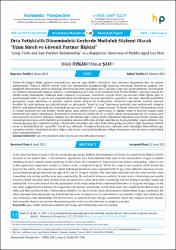| dc.contributor.author | Özkan, Dilek | en_US |
| dc.contributor.author | Şah, Umut | en_US |
| dc.date.accessioned | 2022-10-13T15:06:40Z | |
| dc.date.available | 2022-10-13T15:06:40Z | |
| dc.date.issued | 2021-06-21 | |
| dc.identifier.citation | Özkan, D. & Şah, U. (2021). Orta yetişkinlik dönemindeki geylerde mutluluk söylemi olarak “uzun süreli ve güvenli partner ilişkisi”. Humanistic Perspective, 3(2), 531-556. doi:10.47793/hp.909401 | en_US |
| dc.identifier.issn | 2687-4229 | |
| dc.identifier.uri | https://hdl.handle.net/11729/5004 | |
| dc.identifier.uri | http://dx.doi.org/10.47793/hp.909401 | |
| dc.description.abstract | Türkiye’de bugüne kadar geylerin mutluluklarını üzerine inşa ettikleri söylemlere veya söylemsel kaynaklara dair bir çalışma yapılmamıştır. Özkan’ın (2019) yüksek lisans tezi kapsamında gerçekleştirdiği araştırma sonucunda İstanbul’da yaşayan orta yetişkinlik dönemindeki geylerin mutluluğa dair konuşmalarına kaynaklık eden 7 açıklayıcı repertuar tespit edilmiştir. Bu makalede ise Özkan’ın çalışmasında ulaşılan açıklayıcı repertuarlardan biri olan “Uzun Süreli/Güvenli Partner İlişkisi” repertuarı detaylı bir şekilde analiz edilmektedir. Makaleye temel oluşturan araştırmada, İstanbul’da yaşayan 45-62 yaş arasında, farklı eğitim, gelir ve meslek gruplarından 10 gey ile yarı-yapılandırılmış derinlemesine bireysel görüşmeler yapılmıştır. Ses kayıt cihazıyla kaydedilen görüşmeler yazıya aktarılmış ve metinler söylem analizi yöntemi ile incelenmiştir. Araştırma kapsamında, hazırlık amacıyla öncelikle bir pilot görüşme gerçekleştirilmiştir ve görüşmede “öznel iyi oluş” kavramının psikoloji alanı profesyoneli olmayan kişilere uzak gelmesi nedeniyle soru formunda bu kavram, “mutluluk” ve “yaşam doyumu” ile ikame edilmiştir. Görüşmelerde öznel iyi oluşun parametreleri olan ilişkiler, kişilik yapısı, inanç, eğitim seviyesi, gelir düzeyi ve sağlığın mutlu ve doyumlu yaşama sahip hissetmeleriyle ilişkisi sorulmuştur. Katılımcıların öznel olarak kendilerini iyi ve mutlu olarak tanımlamalarında bir yandan uzun süreli/güvenli bir partner ilişkisinin varlığını öne çıkardıkları, diğer yandan gerek yaşlandıkça beğenilmeyecek olmaları gerekse gey camiada güvenli/uzun süreli ilişkilerin pek mümkün olmaması itibariyle de ilişki olasılıklarını düşük gördükleri tespit edilmiştir. Gey camiada geçmişe göre sadakatin azaldığı ve hatta artık olmadığına dair sıkça ifade edilen görüş, güvenli bir ilişki yaşamanın önünde duran ve kabullenilmiş bir “gerçeklik” olarak inşa edilmiştir. Görüşülen katılımcılar, sadakatin artık olmadığını ifade ettikleri gey cemaatten bireyler olarak hem bundan şikâyet edip bunun karşısında kendilerini edilgen konumluyor hem de bunu normal kabul ediyor görünmektedirler. | en_US |
| dc.description.abstract | So far, there has been no study of the discourses that gay people build on their happiness in Turkey. As a result of the Özkan’s (2019) research as her master theis, 7 interpretative repertoires have been identified that refer to the conversations of gays in middle adulthood living in Istanbul about happiness. In this article, the repertoire of “long term/secure partner relationship”, which is one of the explanatory repertoires reached in Özkan's work, is analyzed in detail. Within the scope of the research, which formed the basis for the article, semi-structured in-depth individual interviews were conducted with 10 gays from different education, income and professional groups between the ages of 45 and 62 living in Istanbul. The interviews recorded with the voice recorder were transcribed into writing and the texts were examined by the method of discourse analysis. In interviews, relationships, personality structure, belief, education level, income level and health were asked about their relationship with the feeling of having a happy and satisfied life. It was determined that the participants of the study subjectively considered themselves to be good and happy, on the one hand, suggesting the existence of a long-term/safe partner relationship, on the other hand, they would not be liked as they got older, and they considered their relationship probability low due to the fact that safe/long-term relationships. In gay community, the often expressed view that loyalty has diminished and even no longer exists is constructed as an accepted “reality” that stands in the way of having a safe relationship. The interviewees, as individuals from the gay community where they express no more loyalty, both complain about it and position themselves passive in the face of it and seem to accept it as normal. | en_US |
| dc.language.iso | tur | en_US |
| dc.publisher | Fuat Aydoğdu | en_US |
| dc.rights | info:eu-repo/semantics/openAccess | en_US |
| dc.subject | Gey | en_US |
| dc.subject | Orta yetişkinlik | en_US |
| dc.subject | Öznel iyi oluş | en_US |
| dc.subject | Güvenli ilişki | en_US |
| dc.subject | Söylem analizi | en_US |
| dc.subject | Gays | en_US |
| dc.subject | Middle adulthood | en_US |
| dc.subject | Subjective well-being | en_US |
| dc.subject | Safe relationships | en_US |
| dc.subject | Discourse analysis | en_US |
| dc.title | Orta yetişkinlik dönemindeki geylerde mutluluk söylemi olarak “uzun süreli ve güvenli partner ilişkisi” | en_US |
| dc.title.alternative | “Long-term and safe partner relationship” as a happiness discourse of middle aged gay men | en_US |
| dc.type | article | en_US |
| dc.description.version | Publisher's Version | en_US |
| dc.relation.journal | Humanistic Perspective | en_US |
| dc.contributor.department | Işık Üniversitesi, Fen Edebiyat Fakültesi, Psikoloji Bölümü | en_US |
| dc.contributor.department | Işık University, Faculty of Arts and Sciences, Department of Psychology | en_US |
| dc.contributor.authorID | 0000-0002-5376-0965 | |
| dc.identifier.volume | 3 | |
| dc.identifier.issue | 2 | |
| dc.identifier.startpage | 531 | |
| dc.identifier.endpage | 556 | |
| dc.peerreviewed | Yes | en_US |
| dc.publicationstatus | Published | en_US |
| dc.relation.publicationcategory | Makale - Ulusal Hakemli Dergi - Kurum Öğretim Elemanı | en_US |
| dc.contributor.institutionauthor | Şah, Umut | en_US |


















